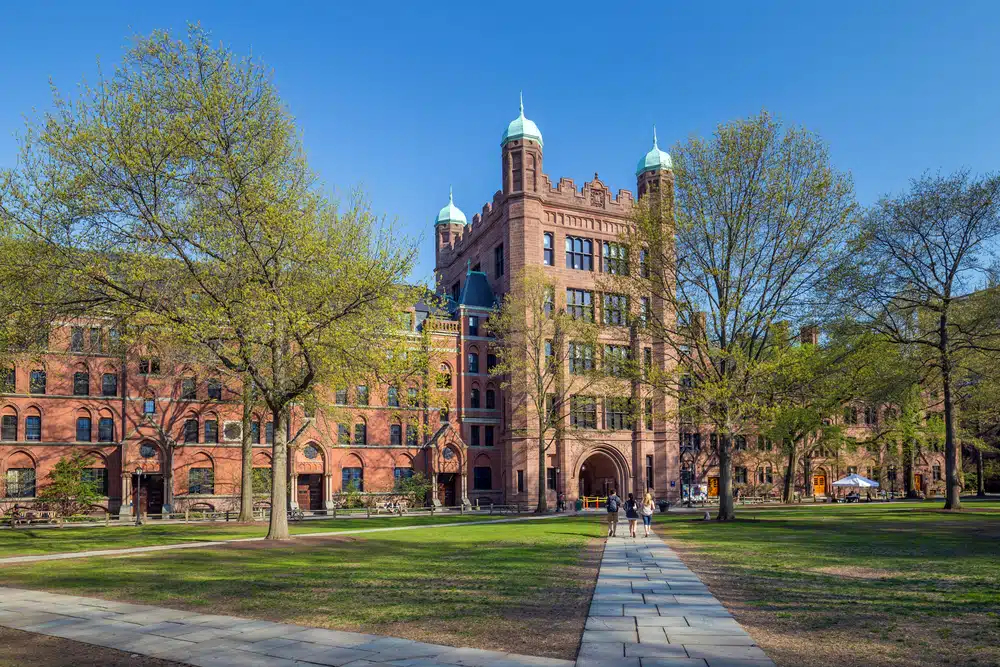Yale University stands as one of the most prestigious and historic educational institutions in the world. It is known for its dedication to academic excellence, ground-breaking, and lively campus life. It is in New Haven, Connecticut. As a member of the Ivy League, Yale has been a beacon of learning and leadership for over three centuries. This article delves into the rich history, academic programs, campus life, and global impact of Yale University.
History and Founding
Yale University was in 1701 as the Collegiate School in the Colony of Connecticut. It was rename Yale College in 1718 in honor of Elihu Yale, a Welsh merchant and benefactor whose generous donation helped sustain the institution in its early years. Originally established to educate clergy, Yale quickly expanded its mission to provide a broad liberal arts education.
Yale has developed into a comprehensive university over the centuries. It played a significant role in shaping American higher education and produced many influential leaders, including U.S. presidents, Supreme Court justices, and Nobel laureates.
Academic Structure and Programs
Yale is brok up into fourteen distinct schools. These schools include Yale College, the undergraduate school, the Graduate School of Arts and Sciences, and twelve professional schools like the Yale School of Management, Yale Law School, and Yale School of Medicine. Yale University Yale College is the heart of the university’s undergraduate education. It has over 80 majors, from the humanities and social sciences to engineering and the natural sciences. The curriculum emphasizes critical thinking, communication abilities, and a solid liberal arts foundation.
Graduate and Professional Schools
The graduate and professional programs at Yale are among the best in the world. Yale Law School is consistently rank among the top in the world. The Yale School of Medicine and Yale School of Public Health lead in medical education and research. Similarly, the School of Management is renown for its innovative programs and global perspective.
Distinguished Faculty and Alumni
Yale boasts an impressive roster of faculty members, many of whom are leaders in their respective fields. Yale professors are not only skilled researchers but also committed educators. Close mentoring and academic collaboration are fostered by the university’s low student-to-faculty ratio. Yale’s alumni network is equally illustrious. It includes five U.S.
Presidents—William Howard Taft, Gerald Ford (who attended Yale Law School), George H.W. Bush, Bill Clinton, and George W. Bush. Authors Sinclair Lewis and Jhumpa Lahiri, actors Meryl Streep and Paul Giamatti, and entrepreneurs like Ben Silbermann (Pinterest co-founder) are among the other notable alumni.
Research and Innovation
Yale is a prominent research institution that is deeply committed to expanding knowledge. The university supports interdisciplinary research across a broad spectrum of fields. From groundbreaking work in genetics and neuroscience to pioneering studies in political science and environmental policy, Yale researchers contribute significantly to global understanding and innovation. The Yale Center for Genome Analysis, the Yale Quantum Institute, and the Yale School of Engineering & Applied Science are just a few of the cutting-edge research centers at the university.
Libraries and Museums
Yale’s resources for scholarship are among the best in the world. The Yale University Library system is the third-largest academic library in the United States, housing over 15 million volumes. The Beinecke Rare Book & Manuscript Library and the Sterling Memorial Library are campus icons. Additionally, the university is home to a number of world-class museums, such as Yale University Art Gallery: America’s oldest university art museum, with collections ranging from ancient to contemporary art.
Campus and Architecture
Yale’s campus is known for its beautiful architecture, which combines Gothic, Georgian, and contemporary styles. There are residential colleges, academic buildings, libraries, theaters, and laboratories on the approximately 260-acre central campus in downtown New Haven. Yale’s 14 residential colleges are modeled after Oxford and Cambridge’s college systems and each has their own distinctive culture and identity. In addition to providing additional academic and social support, these communities give students a sense of belonging.
Student Life and Organizations
Yale fosters a vibrant student life with over 500 student organizations, covering a wide range of interests including politics, arts, athletics, journalism, service, and entrepreneurship. The Yale Daily News is the oldest independent daily college newspaper in the United States. One of the most cherished musical traditions at the university is The Whiffenpoofs, a cappella group that was established in 1909. Students also engage in social justice and activism, participate in Model UN, and contribute to community service through Dwight Hall, Yale’s Center for Public Service.
Diversity and Inclusion
Yale is committed to creating an inclusive and diverse academic community. It actively works to ensure that students from all backgrounds have access to its educational opportunities. Domestic students receive financial aid without regard to financial need, while international students receive generous assistance. On campus, numerous cultural centers and organizations aid underrepresented groups, such as the Afro-American Cultural Center.
Both New Haven and Yale Because Yale is in New Haven, students have access to a dynamic urban environment. New Haven is a historic city that is well-known for its museums, thriving arts scene, and renowned eateries (including the place where American-style pizza was first invented). The university is actively involved in community development through education initiatives, health partnerships, and economic revitalization projects.
Future Outlook
Yale University maintains its core values of excellence, leadership, and service even as it enters its fourth century. Major initiatives in sustainability, technology, and global engagement are shaping the university’s future. Yale is investing in the sciences through new facilities and interdisciplinary programs, while also reaffirming its commitment to the humanities and social sciences. These developments ensure that Yale remains at the forefront of higher education in the years to come.
Conclusion
Yale University is more than just a prestigious university; it is also a community that is committed to learning, creativity, and social good. With its historic legacy, world-class faculty, and global influence, Yale continues to inspire generations of students and scholars to think deeply, lead boldly, and make a meaningful impact on the world.
